"You're getting stuff the New York Times never will," Al Rockoff says, pointing to a series of framed images before him. "That's the truth."
The stuff is extraordinary: A single human hand being carried away by stretcher from the scene of a rocket attack.
The blackened, decomposing corpse of an AP photographer killed by Khmer Rouge troops.
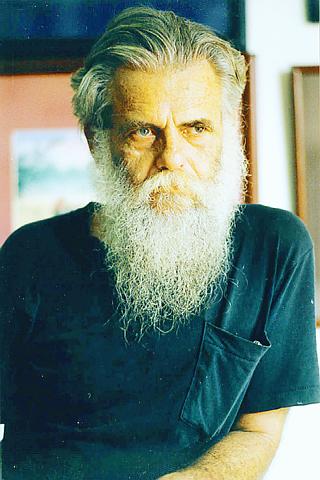
PHOTO: STEVEN O'CONNELL
A line of US Marines bracing against the wind kicked up by helicopter rotors during the American evacuation from Phnom Penh. For almost a decade, beginning as a US Army combat photographer in what he refers to as "the American war" in Vietnam followed by a stint as a freelance photographer from 1973-1975 capturing the brutal insanity of the Cambodian conflict and the eventual triumph of the Khmer Rouge, Rockoff gained a reputation for unforgettably macabre images he sold to Newsweek, AP, UPI, and the New York Times.
It was a brilliant career prematurely aborted by what he describes as a media "blacklist" against the use of his work following Rockoff's evacuation from the compound of Phnom Penh's French Embassy, along with the last remnants of the city's expatriate population, on May 7, 1975.
"I've been stiffed and ostracized," the bearded 52-year-old who was portrayed by the actor John Malkovich in Roland Joffe's film The Killing Fields says bitterly. "It's payback time."
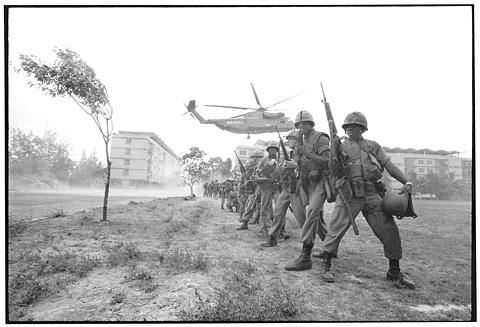
Payback, for Rockoff, is a special exhibition of his work in Phnom Penh to commemorate the 25th anniversary of the fall of the city to the Khmer Rouge on April 17, 1975.
It's an exhibition that Rockoff, out of all the photojournalists who covered the Indochinese conflict, is uniquely qualified to give.
"I shed blood for my art," he says of his passion for combat photography that led him to be wounded nine times and left him with the same unsettling thousand yard stare discernible in many of his subjects.
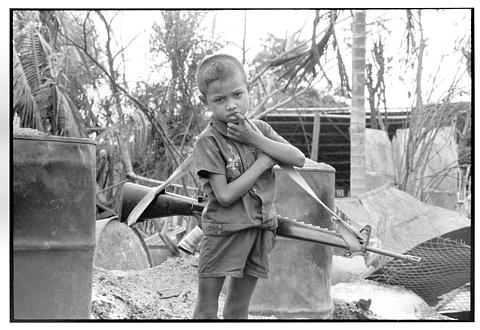
But it was Rockoff's coverage of the fall of Phnom Penh that was the pinnacle of a career he describes as "creative endeavor with an adrenaline rush."
As the Khmer Rouge entered Phnom Penh on April 17, 1975, beginning the systematic murder of military and government officials of the defeated Lon Nol regime and the evacuation of the general population to the Cambodian countryside, Rockoff roamed the city snapping incomparable photos of a society in its death throes.
"When the Khmer Rouge entered Phnom Penh people lined up along the sides of the street waving, while loudspeakers announced `the war is over , do not resist,'" he recalled.
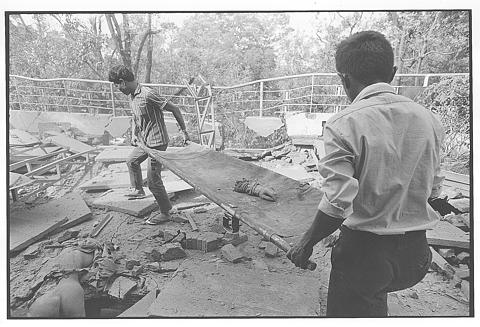
"People though the worst was over ... little did they know it had just begun."
Rockoff had an eerie first hint of the harsh reality of Cambodia's new order later that afternoon, when along with New York Times correspondent Sidney Schanberg and Cambodian interpreter Dith Pran he was detained by Khmer Rouge troops on the Japanese Bridge in central Phnom Penh.
"A Khmer Rouge soldier opened up Schanberg's travel bag and found his US$10,000 of `emergency money' and some underwear," he explained. "The soldier fanned through all the notes carefully, then took the underwear, leaving the money in the bag for Schan-berg."
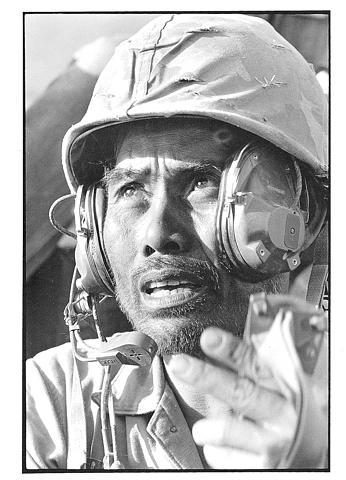
The symbolism of the soldier's disdain for money did not escape Rockoff -- in the pure, hard flame of the Khmer Rouge revolution, money was a fetish of the old society that was coming to an end. Rockoff becomes visibly angry at the mention of Schanberg, whom he accuses of deliberately and maliciously sabotaging his career.
"Schanberg left on the first convoy out of the French Embassy and asked me for the rolls of film that I'd shot," Rockoff said heatedly.
"When I told him that I was on day rate for Newsweek and that he could only have the pictures they didn't want he said `See if the New York Times ever runs any of your stuff again.'"
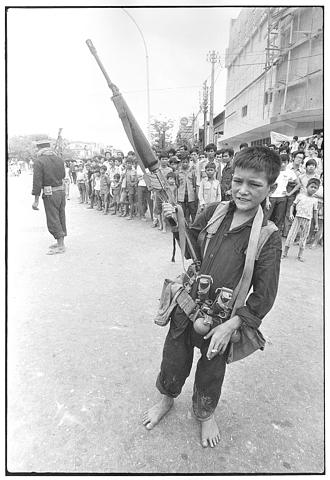
In the end Newsweek only ran three of Rockoff's photos, and upon his return to the US he was relegated to the journalistic margins, the vast majority of his work unseen.
Insult was added to injury following the release of the movie The Killing Fields, which Rockoff insists is full of "slanderous" misrepresentations of the historical record.
Rockoff remains incensed by the movie's representation of Schanberg as a concerned, sensitive individual who agonized over the fate of his Cambodian interpreter, Dith Pran.
"Schanberg is a coward who put other people's lives in danger," Rockoff barked angrily. "He used and abused Dith Pran and personally tried to have me thrown out of the safety of the French Embassy in April 1975."
Rockoff is most aggrieved at one of the scenes most emotional moments: when a photograph that Malkovich as Rockoff has taken of Dith Pran for a false passport is spoiled by a chemical reaction.
According to Rockoff and others who were present, the scene is completely fictional.
"It never happened," Rockoff said. "That movie blames and slanders me."
Through his exhibition and a planned book of photographs documenting the Cambodian conflict and its post-Khmer Rouge reconstruction, Rockoff hopes to correct what he feels are equally serious public misconceptions about the destruction of Cambodia he chronicled in the 1970s.
"A lot of people don't even remember what the war [in Cambodia] was all about, and specifically the role of the [1970] American invasion in what eventually happened here," he said grimly. "The blood debt that America owes Cambodia is a big one."

DAREDEVIL: Honnold said it had always been a dream of his to climb Taipei 101, while a Netflix producer said the skyscraper was ‘a real icon of this country’ US climber Alex Honnold yesterday took on Taiwan’s tallest building, becoming the first person to scale Taipei 101 without a rope, harness or safety net. Hundreds of spectators gathered at the base of the 101-story skyscraper to watch Honnold, 40, embark on his daredevil feat, which was also broadcast live on Netflix. Dressed in a red T-shirt and yellow custom-made climbing shoes, Honnold swiftly moved up the southeast face of the glass and steel building. At one point, he stepped onto a platform midway up to wave down at fans and onlookers who were taking photos. People watching from inside

A Vietnamese migrant worker yesterday won NT$12 million (US$379,627) on a Lunar New Year scratch card in Kaohsiung as part of Taiwan Lottery Co’s (台灣彩券) “NT$12 Million Grand Fortune” (1200萬大吉利) game. The man was the first top-prize winner of the new game launched on Jan. 6 to mark the Lunar New Year. Three Vietnamese migrant workers visited a Taiwan Lottery shop on Xinyue Street in Kaohsiung’s Gangshan District (崗山), a store representative said. The player bought multiple tickets and, after winning nothing, held the final lottery ticket in one hand and rubbed the store’s statue of the Maitreya Buddha’s belly with the other,

‘NATO-PLUS’: ‘Our strategic partners in the Indo-Pacific are facing increasing aggression by the Chinese Communist Party,’ US Representative Rob Wittman said The US House of Representatives on Monday released its version of the Consolidated Appropriations Act, which includes US$1.15 billion to support security cooperation with Taiwan. The omnibus act, covering US$1.2 trillion of spending, allocates US$1 billion for the Taiwan Security Cooperation Initiative, as well as US$150 million for the replacement of defense articles and reimbursement of defense services provided to Taiwan. The fund allocations were based on the US National Defense Authorization Act for fiscal 2026 that was passed by the US Congress last month and authorized up to US$1 billion to the US Defense Security Cooperation Agency in support of the

HIGH-TECH DEAL: Chipmakers that expand in the US would be able to import up to 2.5 times their new capacity with no extra tariffs during an approved construction period Taiwan aims to build a “democratic” high-tech supply chain with the US and form a strategic artificial intelligence (AI) partnership under the new tariffs deal it sealed with Washington last week, Taipei’s top negotiator in the talks said yesterday. US President Donald Trump has pushed Taiwan, a major producer of semiconductors which runs a large trade surplus with the US, to invest more in the US, specifically in chips that power AI. Under the terms of the long-negotiated deal, chipmakers such as Taiwan Semiconductor Manufacturing Co (TSMC, 台積電) that expand US production would incur a lower tariff on semiconductors or related manufacturing